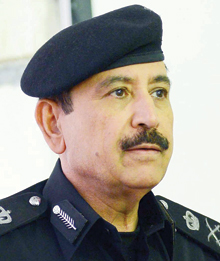 Major General Abdullah Al- Muhanna
Major General Abdullah Al- MuhannaKUWAIT: the Ministry of Interiors's (MOI) Assistant Undersecretary for Traffic Affairs Major General Abdullah Al-Muhanna strongly denied reports about intentions to increase traffic fines by 500 percent. "This is completely illogical. The percentages suggested by the traffic sector vary between 70-100 percent," he underlined, noting that the parliament would have to pass the study, amend or reject it once it was finished.
Muhanna added that increasing traffic fine values positively helps adjust motorists' conduct and law abidance. "Statistics showed that two months of imposing strict traffic rules and tougher fines helped reduce speeding tickets by 62 percent, reckless driving by 20 percent, driving through red lights by 25 percent and driving on the opposite side of the road by 55 percent," he explained, pointing out that the aim of increasing the fines was to deter traffic law violators.
Responding to a question about traffic jams, Muhanna stressed that he was optimistic that the problem would be solved once the road grid development projects were concluded and many bridges were built, in addition to expanding many of the existing roads. Commenting on the rules followed on granting expatriates driving licenses, Muhanna stressed that the traffic department fully respected the ministerial decision issued in this regard. "One would be wrong to think that the aim of the law is to prevent expats from getting driving licenses," he remarked, pointing out that the amendments made to the law currently in effect helped overcome some problems in the previous law and included more categories of expats to those eligible to get driving licenses.
Muhanna would not respond to a question whether getting a driving license in Kuwait was the hardest worldwide, but stressed that some GCC states had asked to review the rules Kuwait follows on granting expats driving licenses in order to apply whatever fits in each respective state, especially since the law helped control the process in view of how easy it was to own a vehicle in all GCC states.
Notably, expats wishing to get a driving license in Kuwait must have a valid residency visa for a minimum of two years, hold a university degree and get a minimum monthly salary of KD 600. However, traffic laws exempted a few categories from the above general conditions including Kuwaiti citizens' wives, widows or divorcees who have Kuwaiti children, Kuwaiti women's expat husbands and children, illegal residents (bedoons) holding valid security cards, expats' undergraduate students studying in Kuwait, members of the diplomatic corps, professional athletes playing in Kuwait, drivers, representatives (mandoubs) who already have valid driving licenses, domestic workers working for the same sponsor for at least five years (provided they change profession to drivers), oil sector technicians, pilots, co-pilots, captains, assistant captains, nurses, physiotherapists, medical technicians, washers of dead bodies and housewives and mothers married to judges and members of the public prosecution, experts and advisors, academic teaching staff members, doctors, pharmacists and general managers and their assistants.
The law also exempted judges, members of the prosecution, experts, advisors, academic teaching staff members, journalists, doctors, pharmacists, researchers, translators, librarians, imams working for the government, teachers, social workers, engineers and sports coaches from the residency and salary conditions provided they hold a university degree. Moreover, the law also exempts executives and general managers, accountants and mandoubs from the residency condition provided they get at least KD 600 monthly salaries and hold university degrees. - Al-Anbaa










